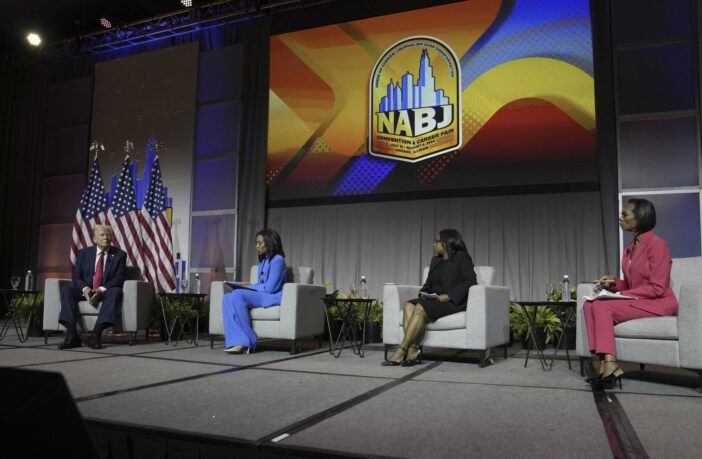Black journalists around the nation are in an uproar after hearing former President Donald J. Trump, Republican presidential nominee, address the National Association of Black Journalists (NABJ) at their annual convention and career fair in Chicago on July 31. Shown here, Trump (left) on the NABJ stage with Rachel Scott, senior congressional correspondent for ABC News; Kadia Goba, politics reporter at Semafor; and Harris Faulkner, anchor of The Faulkner Focus on FOX News. (AP Photo/ Charles Rex Arbogast)
By Tashi McQueen
AFRO Political Writer
tmcqueen@afro.com
Former President Donald J. Trump, Republican presidential nominee, fueled controversy during a question and answer session at the 2024 National Association of Black Journalists (NABJ) Annual Convention and Career Fair on July 31.
Rachel Scott, senior congressional correspondent for ABC News, opened the conversation by asking Trump to explain why Black voters should vote for him, considering previous insulting comments he has made about Black elected officials and other people of color.
“I don’t think I’ve ever been asked a question in such a horrible manner,” said Trump, in response to the first question.
“Are you with ABC? Because I think they’re a fake news network. I think it’s a very rude introduction,” he continued.
Trump evaded a response to the first question, instead taking several digs at Scott, the company she works for and NABJ itself for a late start due to technical difficulties.
The conversation with the former president caused a stir once it was disclosed to the Black journalists that make up NABJ and the general public. NABJ leadership addressed the controversy around the invitation, emphasizing that they spent months in communication with both political parties about participating in the convention.
Trump said NABJ invited him “under false pretense,” claiming that Vice President Kamala Harris (D) would be in attendance for the session as well. Ultimately, she was not on the stage for the conversation at the convention.
“NABJ has been in talks with both the Democratic and Republican parties since January. NABJ was in contact with Vice President Kamala Harris’ team for an in-person panel before President Joe Biden dropped out of the race in July,” said NABJ President Ken Lemon in a statement. “We were advised by her campaign at the time that her schedule could not accommodate this request.”
Lemon said the last word they received from her campaign, earlier this week, was that Harris would not be available in person or virtually during the convention. Less than an hour before the conversation, NABJ announced that they were in conversation with Harris’ campaign for a live or virtual Q and A in September.
“We are in talks about virtual options in the future and are still working to reach an agreement,” continued Lemon.
Throughout the session with Trump, moderators tried to move forward with the Q and A by asking questions on some of the most pressing issues for Black Americans, such as the economy and abortion.
On the topic of abortion, Trump said he is proud of the Supreme Court’s move to overturn Roe v. Wade, leaving the decision to each individual state.
“Right now, it’s an amazing thing. It’s out of the federal government, it’s [up to the]states and people are voting,” he said.
Since Roe v. Wade was overturned, at least 14 states have criminalized abortions.
During the session, Trump doubled down on criticism of Harris’ actions around the border and expressed concern about “Black jobs” being taken by people who enter the U.S. illegally.
“Coming from the border are millions and millions of people that happen to be taking Black jobs,” said Trump.
When asked to finally answer the question of “What is a ‘Black job?’” Trump stated that “a Black job is anybody that has a job.”
Trump claimed Harris has allowed millions to flock to the border, referring to her as the “border czar” due to Biden assigning her to address the root causes of Central American migration as vice president.
“She’s done a horrible job,” criticized Trump.
Before the Q and A, NABJ convention co-chair Karen Attiah announced her resignation via X, formerly known as Twitter.
“I have decided to step down as co-chair from this year’s #NABJ24 convention in Chicago,” she said. “While my decision was influenced by a variety of factors, I was not involved or consulted with in any way with the decision to platform Trump in such a format.”
Lemon backed NABJ’s decision to move forward with Trump’s invitation stating that it was in line with their usual practices concerning political candidates
“It has always been our policy to ensure that candidates know that an invitation is not an endorsement,” said Lemon. “While we acknowledge the concerns expressed by our members, we believe it is important for us to provide our members with the opportunity to hear directly from candidates and hold them accountable.”
The convention included a live fact-checking option on the NABJ website, which attendees applauded at the event.
Ahead of the session, the National Newspapers Publishers Association (NNPA) issued a strong statement against the invitation, demanding that it be rescinded.
“I strongly oppose Trump’s participation in the NABJ annual convention and career fair,” declared NNPA National Chair Bobby Henry, via the NNPA Newswire. “The NNPA represents over 250 African American-owned newspapers and media companies and has been a pillar of the Black Press of America for 197 years.”
Henry said Trump’s “divisive rhetoric and actions have harmed marginalized communities, particularly the Black community.”
“Allowing him a platform at this event undermines the NABJ’s values of inclusion and solidarity and risks normalizing his damaging behavior.”
NABJ was founded on Dec. 12, 1975 by a group of 44 individuals with a focus on providing “quality programs and services to and advocacy for Black journalists worldwide.”



